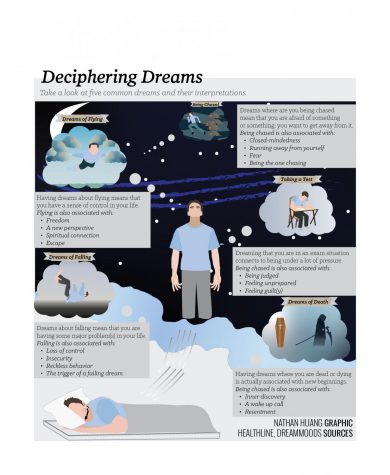Realms of the Mind
Students, physician discuss impact of dreams on psychology, state of mind
For junior Manav Musunuru, everyday activities, events and stresses often manifest themselves in his dreams.
“A lot of my dreams are just things that happened throughout the day, they’re all bashed together into one dream, plus things that I’ve been thinking about a lot. If there’s a lot of homework that I have to do, then I’ll have a lot of work to do (in my dream), or if I’m really stressed out about a test, I’ll have a dream that takes place in a classroom,” he said.
Musunuru is not alone. In fact, a 2020 study conducted by researchers based in Rome and Cambridge analyzed 24,000 reported dreams and suggested they are psychological extensions of reality, which means they actually represent realistic events that might happen to people when we are awake.
Musunuru said he often writes down his dreams to think about and connect them to events that happened to him in his daily life.
“Sometimes I text someone like, ‘Oh, I just had this really weird dream,’ and I tell them what was in the dream. Then, later I go back and reread what I wrote, and sometimes I’ll be like, ‘Oh, I had this dream because that day I was talking about this’ or something,” he said. “Or, if I go back and look at my texts and look at what I was talking about with other people before then, then I can probably figure out why I had that dream.”
According to senior Amy Stafford, dreams can often be much more vivid for her due to her insomnia, which is associated with disturbances to the Rapid Eye Movement (REM) stage of sleep. REM is the stage in which dreams are generally accepted to take place within the human brain.
After participating in a sleep study to gather more data about her insomnia, Stafford said she was able to learn more about her condition.
In general, dream interpretation can often have varying consequences depending on how the dreams are interpreted, as per psychiatrist Dr. Gagan Tindoni. If one chooses to interpret their dreams in a more negative way, they may inadvertently pave the way to a more negative mental state of mind, which is why it is important to avoid jumping to conclusions based on what appears in a dream.
“It’s very important how we interpret those dreams––if we look at something that happens in a dream in a positive way, then we can improve our lives, but if we look at them in a negative way, that can stop us from doing a lot of important things,” Tindoni said. “That’s why the role of psychology is that you want to interpret those dreams in a positive way, and they can help you develop some cognitive capabilities.”
Tindoni added that in a medical setting, dream interpretation can often help in clinical observation because it allows the patient to become more involved in the treatment process as well as increase insight into problems that the patient might be facing.
Musunuru said he occasionally did try to find deeper meanings to his dreams initially but now realizes his dreams are often more simple representations of his daily life rather than complex reflections of personality.
As an example of one of his most fantastical dreams, Musunuru said one was when he dreamt he was in an extremely remote part of Alaska and had to face a forest fire.
“We were in Alaska and I was with my family and some family friends, and there was a wildfire. It was like an episode of ‘Survivor,’ so it was in the middle of nowhere. So there was a forest fire and we had to leave, but then it reset the day so I knew everything that was going to happen, but it was before the forest fire, so it was really weird,” he said.

With regards to the COVID-19 pandemic and the school closures last March, along with this year’s hybrid/virtual schedule, both Musunuru and Stafford said it allowed them to sleep in more often, which meant they were able to dream more.
“With online learning and hybrid schedules, I don’t have to stick to a specific schedule throughout the week and going to school two or three times a week, I stay up however late I want one day and then the next day I have to stick to a schedule,” Stafford said. “I feel like I can sleep in a lot more on the days I don’t have to go to school, I feel like my dreams are more vivid and I have more of them.”
Tindoni added via email that dreams can have a therapeutic aspect to them as well, especially during these times.
“Although what we experience in our dreams is make-believe, the emotions that go along with them are quite real, and dreams can help heal those emotions,” he said.
For students who may be interested in dream interpretation, Musunuru said he suggests they start by writing down their dreams to understand them in a better light, then try to find connections between the dream and any recent events in their life.
“At least in my case, my dreams really aren’t that symbolic; it’s just everything I’ve been doing in the time before: anything I’ve been watching, anything I’ve been stressed over, anyone I’ve seen. All of that just gets combined into a dream and because all of those are different topics, the dream ends up being really weird but when you break it apart it’s not that complicated.”

